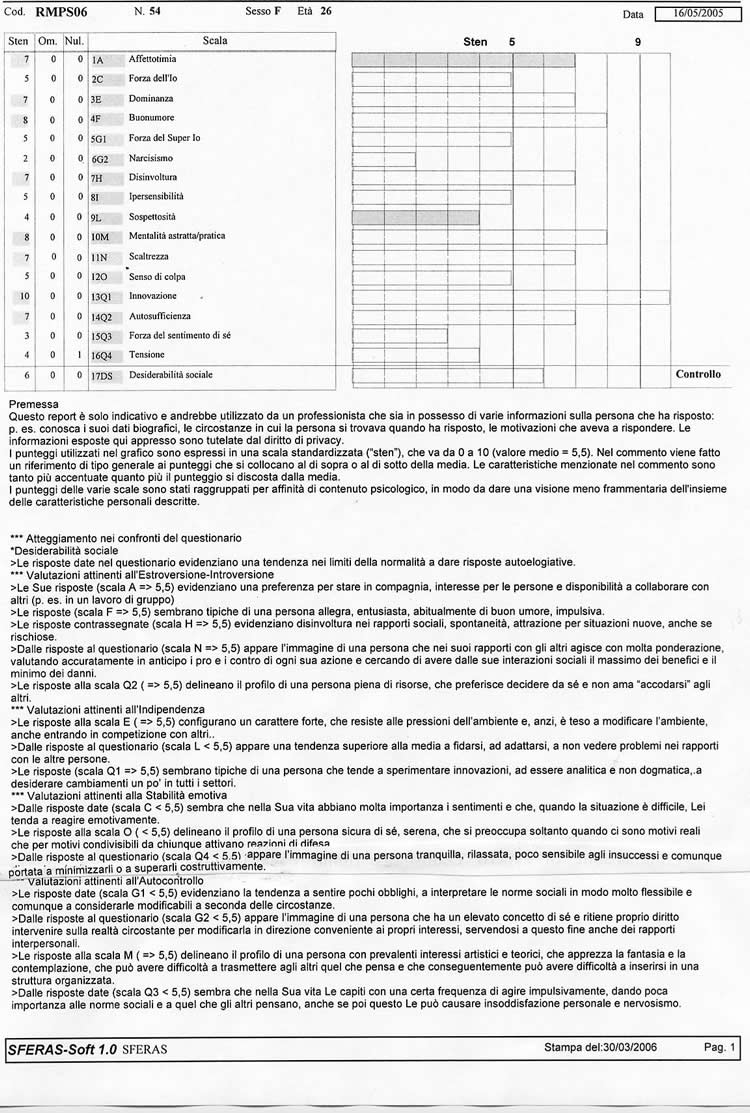Scales
SFERAS produces sten scores (from 0 to 10, average 5.5, SD =2), for each of the following scales:
A Warmth
+ Warm, co-operative - Reserved, Ready to criticism, Hard
C Ego Strength (Emotional Stability)
+ Emotionally Stable, Calm - Reactive, Easily upset
E Dominance
+ Dominant, Competitive, Stubborn - Deferential, accommodating, Easily led, Conforming
F Liveliness
+ Lively, Easy-going, Talkative - Serious, Taciturn, Prudent
G1 Super-Ego Strength (Rule-Consciousness)
+ Rule-Conscious, Persevering - Expedient, Feels few obligations
G2 Narcissism
+ Manipulative, Outstanding - Scheming, Egotist, Unrealistic
H Social Boldness
+ Venturesome, Socially bold - Shy, Threat sensitive, Self conscious
I Sensitivity
+ Sensitive, Tender minded, Vulnerable, Looking for help - Utilitarian, Self-reliant, Realistic
L Vigilance
+ Vigilant, Hard to fool - Trusting, Adaptable, Easy to get on with
M Abstractedness
+ Abstracted, Imaginative, Absent minded, Careless of practical matters - Grounded, Conventional, Regulated by external realities
N Shrewdness
+ Shrewd, Calculating - Genuine, Socially unskilled
O Guilt proneness
+ Apprehensive, Worrying, Self reproaching, Insecure - Self-Assured, Confident
Q1 Openness to Change
+ Open to Change - Traditional
Q2 Self-Reliance
+ Self-Reliant, Resourceful - Group-Oriented, A "follower"
Q3 High self-concept control
+ Controlled, Perfectionistic, Following self-image - Tolerates disorder, Follows own urges, Careless of social norms
Q4 Tension
+ Relaxed, Tranquil - Tense, Frustrated
? Missing answers + Incomplete Test - Unreliable
DS Social Desirability + Conforms to a socially desirable stereotype
Reliability
Reliability has been estimated calculating dependability coefficients, i.e. correlations between two administrations of SFERAS at three weeks interval - a lapse of time insufficient for people to change and sufficient for them to forget most items. Coefficients of correlations between corresponding scales showed an average r = 0.81 on a sample of N = 56 university students, mainly females, age average 20 (L. Boncori et al., in press)
Structure validity
An ACP has been calculated on a sample of N = 121 university students, mainly females, average age 20. Results show four factors. The 1st factors (3.17% of the total variance) may be read as Sensitivity vs. Ego strength and Assertivity. The 2nd factor (2.34% of the total variance) can be interpreted as Super-Ego strength vs. Practical concerns. The 3d factor (2.16% of the total variance) is similar in composition to the Cattell 2nd stratum factor QI Invia vs. Exvia. The 4th factor (2.01% of the total variance) may be regarded as a measure of Leadership. (L. Boncori et al., in press).
SFERAS and other tests
SFERAS and TALEIA-400A have been administered to 98 university students (78 females and 20 males), from different Italian areas, age average 19, at one week interval. An ACP on the 38 scale scores from both tests, arranged in the same matrix, showed a 1st factor common to both tests and gave evidence to the Authors hypothesis, grounded on recent international research, about continuity between normal personality traits and psychopathological or personality disorders (Boncori e Marogna, in press).
Validity evidence from contrasting groups
Personality profiles on SFERAS of 50 Lawyers and 47 Senior Engineers showed significant differences between profiles as a whole. As to single traits, Lawyers proved to be more TalkatIve and Lively (scale F: p < 0,01) than Engineers, who appeared more Serious and Prudent (L. Boncori, E. Chioccia, in press).
Administering, scoring, and giving test results
SFERAS has a companion dedicated software, SFERAS-soft (L. Boncori e M. Di Marco © L. Boncori e M. Di Marco, 2009). The software allows computer administration or printing booklets and answer sheets.
Answers, marked with a soft pencil on the answer sheet, can be read by a scanner and directly processed by a resident OMR. Raw and sten scores are elaborated in minutes and for each subject a numerical and graphical profile can be printed, followed by a commentary descriptive of results.
